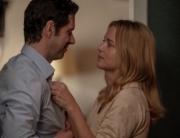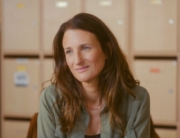![]() Sometimes film festivalgoers just want to have fun. Start off with highbrow subject matter, throw in some edgy direction, and you have a successful opening night, as did the New York Film Festival when The Favourite kicked off its 56th addition last Friday.
Sometimes film festivalgoers just want to have fun. Start off with highbrow subject matter, throw in some edgy direction, and you have a successful opening night, as did the New York Film Festival when The Favourite kicked off its 56th addition last Friday.
This year’s opener was a tighter, sharper selection than 2017’s inert buddy dramedy, Richard Linklater’s Last Flag Flying, starring Steve Carell, Bryan Cranston, and Laurence Fishburne. Pure popcorn entertainment, like the 2014 opener Gone Girl, now seems like a faint memory. Perhaps it goes without saying, but the days of the NYFF starting off with a niche film by a European director is a thing of the past. (Ten years ago, the festival opened with Alain Resnais’s little seen Wild Grass.) If a higher media profile is needed for a big initial splash, then The Favourite fits the bill, with its stars Emma Stone and Rachel Weisz.
The film, though set in the early 18th-century English court of Queen Anne, is hardly a reverent and staid period piece. Under the direction of Yorgos Lanthimos, the atmosphere is bawdy and baroque, like a trippy funhouse. Lanthimos has previously created worlds with their own unique codes of behavior, and in the best of them, such as The Lobster, these mini-universes take a theme and expand and twist it, transforming the movie while never losing narrative momentum. He does the same here. (Two films he made in his native Greece before he started working with Hollywood A-listers, Dogtooth and Alps, are worth checking out. Both are disturbing and beguiling.)
Downton Abbey fans, prepare to swoon. Much of this new movie was filmed at Hatfield House, in Hertfordshire, which was built by Robert Cecil, the chief minister in the Elizabethan and Jacobean courts, and the costume design by Sandy Powell is sumptuously over-the-top as well. Though the screenplay has been inspired by historical figures, viewers should not expect a literal and historically faithful rendition. Additionally, Lanthimos and his cinematographer, Robbie Ryan, often use a wide fish-eyed lens, as though viewers are looking at the equivalent of either a convex mirror or a fishbowl.
The plot’s hothouse heat emanates from the rivalry between Lady Sarah Churchill, the Duchess of Marlborough (Weisz), and her penniless country cousin Abigail Hill (Stone) for the Lady of the Bedchamber title—with all of the innuendo that may imply. Both women take any advantage and run with it, grabbing all of the power they can through an intimate relationship with the malleable Queen Anne (Olivia Colman). In the duchess’s case, that is through strategizing British military options in the war against France. (Plot-wise, another movie that comes to mind is Greta Garbo’s Queen Christina from 1933, which featured a similarly trusting relationship between the titular ruler and a lady-in-waiting—one that was implicitly coded at the time as lesbian.)
Part of the film’s appeal is that the monarch at the center of the intrigue has not been especially overexposed. To date, she’s perhaps best known for the architecture named after her. Indeed, Queen Anne’s reign, 1702–1714, would rank well below the Elizabethan or Victorian eras when it comes to British historical dramas. The screenwriters build upon what historical evidence has survived the centuries to elaborate on the sexual politics of the time.
The standoff between Sarah and Abigail to become the chief influence upon the queen in all matters political and primal is insulated away from male courtiers, yet the underlying premise behind the tension is the age-old idea that there can only be one winner, resulting in a competitive, non-cooperative arena of caustic catfighting. However, ranking above the two women in the queen’s estimation are her 17 rabbits, hopping rampant throughout the palace, which, as the queen points out in one of her many somber moments, represent her 12 miscarriages and five dead children.
Not a minute goes by when someone isn’t spewing a bon mot and landing a direct hit, turning the scenario into a saucy Monty Python–like sketch, with enough contemporary language to jar the ear—viewers might also learn a new dirty word. All of the characters lay their cards down on the table, so to speak, which is part of the joy and at times the shock value in listening to the bristling wordplay. It also leaves very little to mystery; there are no hidden intrigues underneath all of the ruffles and petticoats. It’s open warfare.
As such, plot points are the direct results of the scheming by Abigail, who rises from scullery maid to become the queen’s bedmate. As played by Stone, there is simply not enough malice or determination seeping through Abigail’s lines of droll dialogue, which cause a disconnect between the actress and the ruthless striver. Yet Stone is more credible as the new girl in court, pratfalling into mud or emphatically fighting off unwanted sexual advances.
The Duchess of Marlborough, meanwhile, relishes her victories, and viewers experience a vicarious thrill as she condescendingly talks down to the ruler and gets away with it. In terms of motivation, Colman as the capricious queen has an easier time than Stone. The role needs not as much justification for her actions, whether because she is the ruler or the fragile state of her mental health; presumably, her mercurial behavior is a sign of manic depression.
As previously mentioned, the director and his team make a point to puncture the picture-perfect, ornate world that they have created with out-of-left-field anachronisms, the most startling of which is a Dancing with the Stars–type court dance. Besides an incongruous duck race, male courtiers pound a nude, bewigged fop with thrown fruit in a stately drawing room. So at times, the film feels like it is in conflict with itself, struggling between the director’s flourishes versus the screenplay’s more linear story line. That’s especially true of the ending, which has puzzled reviewers since the film’s premiere at the Venice Film Festival. For a raucous royal romp, The Favourite concludes on a muted note.







Leave A Comment